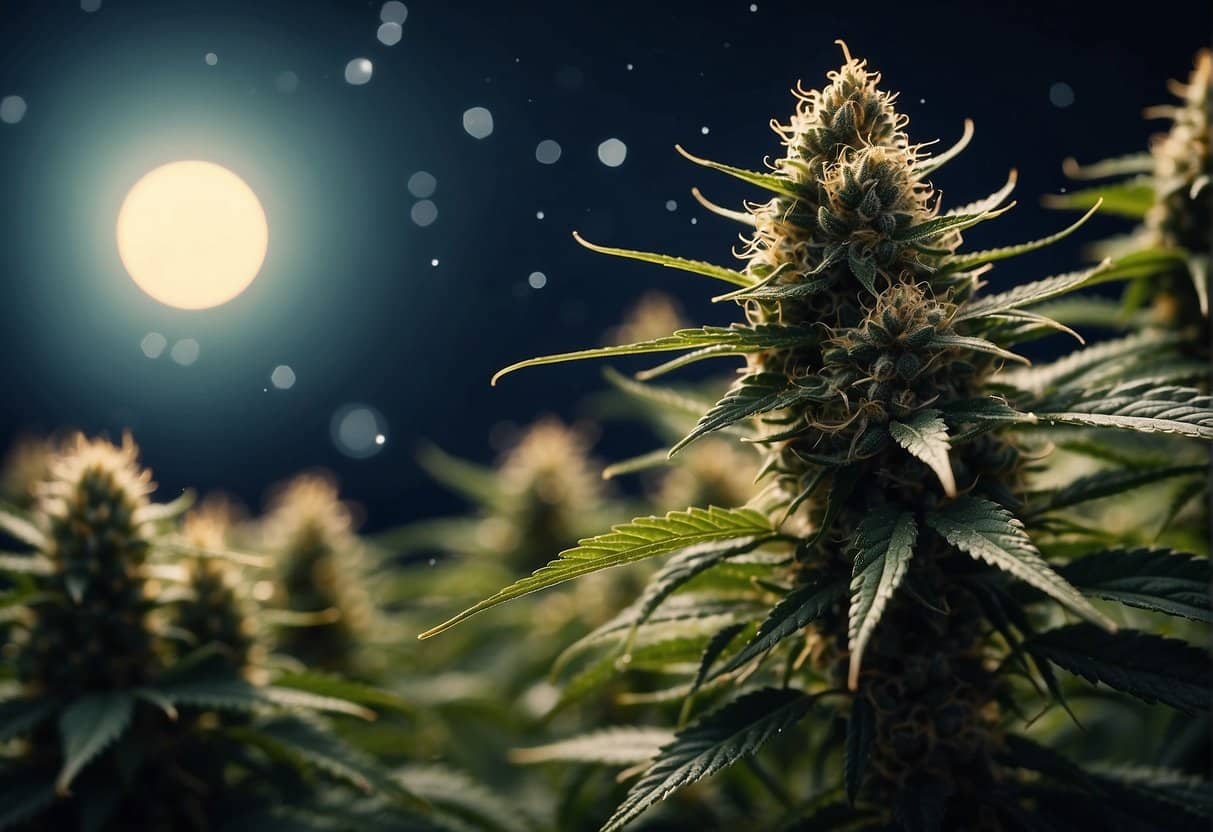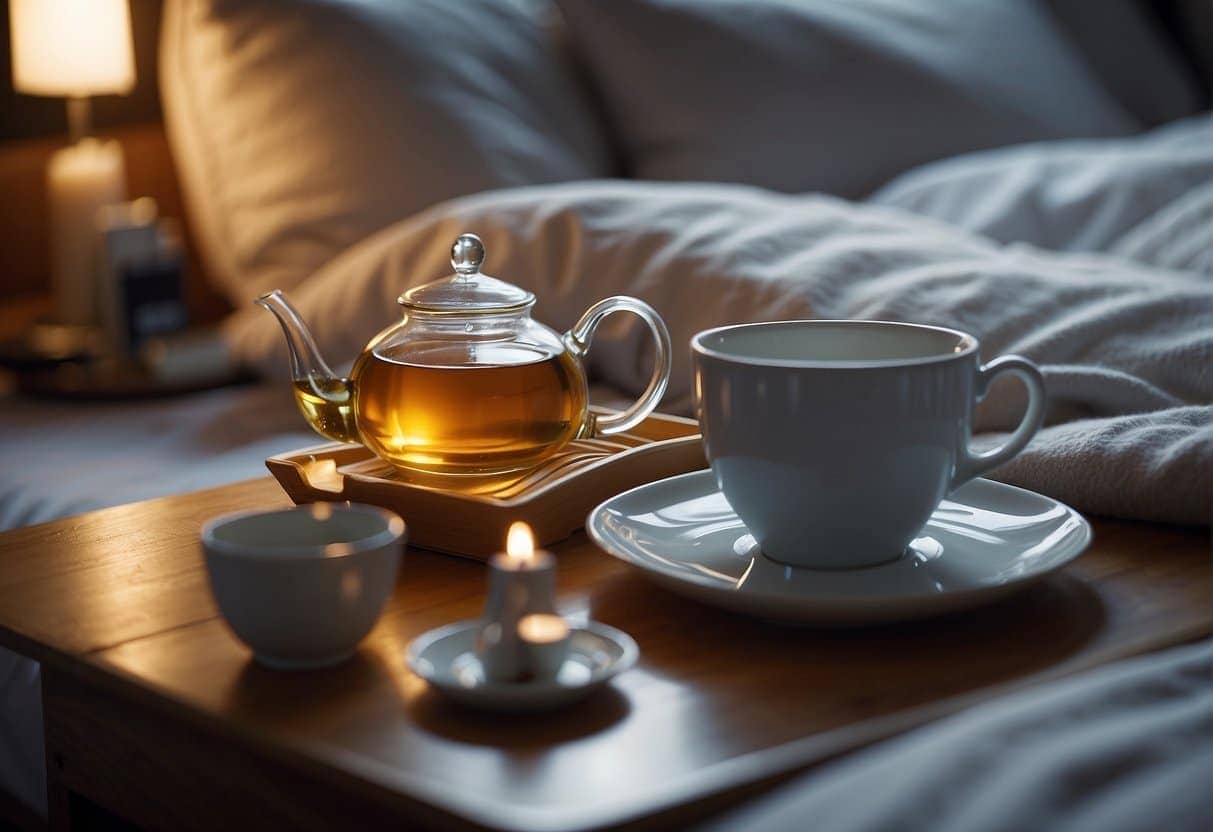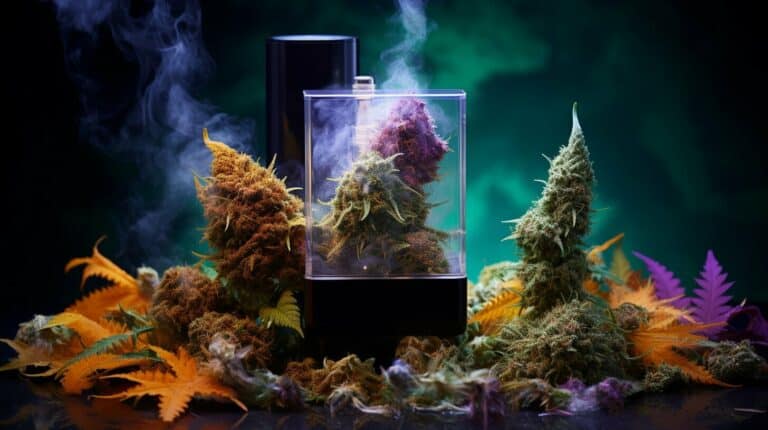THCa for Sleep
Stepping into the sleep aid world is like wandering into a wild forest, where the buzz is all about cannabinoids. Ever bumped into **THCa**? Picture it as THC’s laid-back family member—the one in the cannabis crew that doesn’t make you laugh uncontrollably or hallucinate. While THC grabs the spotlight, THCa chills in the background of the young cannabis plant, making sure you stay sharp. It’s like a sleep ninja, slipping you into slumber land so smoothly, you hardly know it happened. Yet, the verdict is still out. Researchers are knee-deep in studies, trying to crack the code on whether THCa is the bedtime hero we’ve all been searching for. So, why should you perk up your ears? Think of the thrill in uncovering that this sneaky molecule might unlock the secret to blissful sleep. Come along for the ride, and we might stumble upon a groundbreaking snooze solution that flips the script.
- Understanding THCa and Its Properties
- The Role of Cannabis in Sleep Regulation
- Potential Benefits of THCa for Sleep
- Methods of Consuming THCa
- Medical Research on THCa and Sleep Disorders
- Risks and Side Effects of Using THCa for Sleep
- Legal Status and Regulation
- Alternative and Additional Therapies
- Frequently Asked Questions
- How does THCa influence sleep quality?
- Can THCa produce a high similar to THC when used for sleep purposes?
- What is the comparison between THCa and Delta 9 THC in terms of sleep aid?
- How does the percentage of THCa in a product affect its effectiveness for sleep?
- Are there specific benefits of using THCa over other cannabinoids for improving sleep?
- What are the potential side effects of using THCa for sleep?
Cannabis has a complex chemical profile with compounds that may influence sleep patterns. When the famous compound THC is heated, it can exert sedative effects, but the potential for THCa to improve sleep without the psychoactive impact presents an exciting avenue for individuals looking for non-intoxicating options. Some studies have pointed toward cannabis compounds’ ability to assist with sleep disturbances, indicating a need for more targeted research on THCa’s role in sleep health.
Your understanding of cannabis as a sleep aid can expand by considering the scientific insights into how THCa and other cannabinoids interact with the body’s endocannabinoid system. Such interactions are believed to influence various physiological processes, including sleep. As research progresses, it may clarify whether THCa can be an effective sleep aid on its own, potentially offering a restful night’s sleep without the high associated with THC.
Understanding THCa and Its Properties
In this section, you’ll explore the unique qualities of THCa, a non-intoxicating cannabinoid found in cannabis, and how it differs from its more well-known counterpart THC.
Cannabinoids and the Endocannabinoid System
Cannabinoids are a group of compounds found in the cannabis plant. Tetrahydrocannabinolic acid (THCa) is one such cannabinoid before it has been exposed to heat. It’s a direct precursor to tetrahydrocannabinol (THC), the psychoactive component known for its “high” effect. Your body’s endocannabinoid system plays a crucial role in regulating various physiological processes, utilizing cannabinoid receptors such as CB1 and CB2. THCa is believed to impact this system differently than other cannabinoids.
Comparison of THCa to Other Cannabinoids
- THCa:
- Precursor to THC
- Non-psychoactive
- Requires heat through decarboxylation to convert to THC
- THC:
- Psychoactive effects
- Binds to CB1 receptors in the brain
- Produced through the application of heat to THCa
- Cannabidiol (CBD):
- Non-psychoactive
- Interacts with different receptors in the endocannabinoid system
- Potential therapeutic benefits without the “high” of THC
Unlike cannabinol (CBN) or cannabidiol (CBD), THCa does not strongly bind to CB1 receptors in the brain, which is the reason for its lack of intoxicating effects. When you heat cannabis through processes like smoking or vaporizing, THCa undergoes decarboxylation and converts into THC, leading to the well-known psychoactive impacts of cannabis. Understanding how THCa compares to THC and CBD informs your knowledge of how various phytocannabinoids might affect your body and potential therapeutic uses, such as its impact on sleep disturbances.
The Role of Cannabis in Sleep Regulation

Cannabis has long been studied for its potential impact on sleep, with particular interest in how different components and strains may influence sleep quality and disorders. As you explore the role of cannabis in sleep regulation, consider how the plant’s complex chemistry interacts with your body’s sleep patterns.
Indica Versus Sativa Strains and Sleep
Traditionally, Indica strains are thought to have sedative effects that may help you if you have difficulty falling asleep. Their composition often contains a higher concentration of cannabinoids like CBD, which is not psychoactive and is associated with calming effects. On the other hand, Sativa strains tend to have a higher concentration of THC, the psychoactive component of cannabis known for its energizing and alerting properties. These differences can influence the type of strain you might choose as a sleep aid if you are considering medical cannabis for managing sleep problems or insomnia.
Interaction with Sleep Cycles and REM Sleep
Cannabis influences your sleep cycles, notably the rapid eye movement (REM sleep) phase, which is associated with dreaming. THC has been shown to decrease the length of REM sleep, which may result in less time dreaming and more time in deep sleep — the most restorative part of the sleep cycle. However, because REM is crucial for cognitive functions, the long-term implications of altering REM sleep with cannabis use require careful consideration. CBD, on the other hand, may not significantly disrupt REM sleep and could offer a more balanced approach to addressing sleep disorders without profoundly altering your natural sleep architecture.
Remember, while cannabis can be a sedative and a sleep aid, its effects can vary widely among individuals and depend on the chemical composition of the strain, including the ratios of CBD to THC and other cannabinoids present. Hybrid strains may offer a balance of Indica and Sativa effects that could be tailored to your specific sleep needs. It’s important to approach cannabis use thoughtfully and consult with a healthcare professional when using it to manage sleep problems.
Potential Benefits of THCa for Sleep

Tetrahydrocannabinolic acid (THCa), a non-psychoactive precursor to THC found in raw cannabis, has been studied for its potential role in improving sleep quality, especially for individuals experiencing anxiety and chronic pain.
Anxiety and Stress Reduction
THCa may help reduce anxiety levels—a significant benefit since anxiety can greatly affect your sleep patterns. Research has indicated that cannabinoids, including THCa, can exert a calming effect, which might make it easier for you to fall asleep and stay asleep. For instance, results from a systematic review suggest that cannabinoids can have prominent effects on sleep, particularly concerning sleep disturbances that stem from anxiety.
Pain Management and Chronic Pain Relief
Chronic pain can interfere with your sleep cycle, limiting your ability to get the rest you need. As an anti-inflammatory compound, THCa has shown potential in pain management, which could, in turn, lead to better sleep. This aspect is crucial for individuals suffering from conditions like PTSD or chronic pain, as pain relief is often linked with improved sleep. The anti-inflammatory properties of cannabinoids, including THCa and its more commonly known form after decarboxylation, THC, suggest a potential role in pain relief, as mentioned in studies like the one available at Headache Journal. Additionally, THCa, which converts to THC when heated, may offer the benefits of euphoria and relaxation associated with THC without its psychoactive effects when it is in its acidic form.
The interplay of cannabinoids such as cannabidiol (CBD) and THCa in the body’s endocannabinoid system could contribute to their effectiveness as a sleep aid and in sedative medications. While more research is necessary to fully understand the scope of THCa’s therapeutic benefits, the current findings are promising for those seeking alternative sleep aids.
Methods of Consuming THCa
Understanding how tetrahydrocannabinolic acid (THCa) transforms into THC is crucial to grasping the various consumption methods. Each method affects THCa’s activation, its potential intoxicating effects, and how it interacts with your body’s receptors.
Smoking vs. Vaping vs. Edibles
When it comes to consuming THCa, smoking is a traditional method. It involves the combustion of cannabis, which activates THCa into THC, the cannabinoid responsible for the plant’s psychoactive effects. Smoking allows for rapid absorption of cannabinoids and terpenes into your bloodstream via the lungs, giving you a quick onset of effects. Dosing can be challenging to manage due to the fast onset and intensity of effects.
Vaping, on the other hand, heats cannabis at a lower temperature than smoking. This not only preserves more terpenes but also allows for a more controlled release of cannabinoids, including THCa. Vaping is seen as a safer alternative to smoking as it produces fewer harmful byproducts.
Edibles containing THCa offer a non-smoking alternative. They are prepared in a way that THCa is not decarboxylated into THC, allowing you to consume THCa directly. Since edibles must pass through your digestive system, the onset of effects is much slower and dosing can be more precisely controlled. Be aware that edibles may inadvertently contain some level of THC, which can produce psychoactive effects, especially if not properly prepared.
THCa Tinctures and Oils
Tinctures and oils infused with THCa provide a discrete and easy-to-dose method of consumption. They are typically used sublingually, with drops placed under the tongue. This allows for cannabinoids to be absorbed directly into your bloodstream, offering a balance between quick onset and controlled dosing. THCa tinctures and oils tend to preserve the cannabinoid profiles, including THCa, without significant activation to THC.
Whether you opt for smoking, vaping, edibles, or THCa tinctures and oils, understanding the nuances of each method can greatly enhance your experience. Keep in mind that dabbing, although not covered here, is another method to consider, with its own specific implications for THCa consumption.
Medical Research on THCa and Sleep Disorders

Exploring the relationship between THCa and sleep disorders involves examining clinical studies and their implications, and understanding how THCa impacts sleep quality and disorders. The focus here is on the accuracy of current medical research to provide you with a thorough understanding of the potential uses of THCa in treating sleep-related conditions.
Clinical Studies and Their Implications
Research on medical marijuana, specifically tetrahydrocannabinolic acid (THCa), is evolving, with studies exploring its utility in sleep-related disorders such as insomnia, obstructive sleep apnea, and REM sleep behavior disorder. Some studies have noted potential benefits of cannabinoids in sleep management. For instance, research into low-dose medical cannabis oils in multiple sclerosis patients has touched on improvements in sleep disturbances, although it is unclear if THCa directly influenced these improvements (Low-Dose Cannabis Oils Research). Clinical evidence supporting the efficacy of THCa is still developing, with more rigorous clinical trials needed to solidify these findings.
THCa’s Impact on Sleep Quality and Disorders
THCa, a non-psychoactive precursor compound found in the cannabis plant, may influence the nervous system and brain functions related to sleep. However, due to the limited nature of human studies, much of the current knowledge comes from animal model studies. It’s suggested that THCa could affect sleep patterns, potentially alleviating symptoms associated with PTSD and other sleep disorders, yet definitive conclusions await further research. Patients seeking alternative treatments for sleep issues often look toward medical marijuana research for evidence of such benefits, highlighting the importance of continued exploration in this area.
Given the complex nature of sleep and the brain, understanding how THCa acts on the nervous system is crucial. Its interaction with cannabinoid receptors may hold the key to future treatments for sleep disorders. Despite anecdotal reports of improved sleep with cannabis use, scientific consensus must be established through ongoing clinical research.
Risks and Side Effects of Using THCa for Sleep
When exploring THCa for sleep, you should be aware of its potential risks and side effects. While some individuals may experience beneficial effects, it’s crucial to understand the short-term and long-term impacts as well as appropriate dosing to avoid tolerance issues.
Short-Term and Long-Term Side Effects
Short-term side effects of using THCa include changes in appetite, mood alterations, and potential drowsiness during daytime hours. It’s important to note that while THCa is non-psychoactive, the heat of combustion from methods such as vaping can convert it to THC, introducing psychoactive effects. Concerning long-term use, research suggests the possibility of tolerance, leading to increased dosages over time to achieve the same sleep-inducing effects. Though not as potent as THC, THCa may still contribute to withdrawal symptoms when usage is discontinued abruptly.
- Short-Term Effects:
- Altered mood or appetite
- Daytime drowsiness
- Potential interaction with other medications
- Long-Term Effects:
- Tolerance development
- Withdrawal upon cessation
- Unknown impact on physical health
Dosage Considerations and Tolerance
Dosage is critical when using THCa as a sleep aid. Begin with the lowest effective dose and monitor your body’s response. As with many sleep aids, the risk of addiction or dependency is lower with careful dosing. However, self-titration without medical guidance can result in unintended side effects or adverse effects such as weight gain or disrupted sleep patterns. If considering THCa for sleep, especially if it is replacing other medications, consult a healthcare provider to establish a safe dosing regimen and mitigate risks related to tolerance.
- Dosage Tips:
- Start with a low dose and adjust carefully.
- Avoid using THCa as the sole sleep aid for extended periods.
- Regular review with a healthcare provider is advised.
Legal Status and Regulation
Navigating the legal landscape of cannabis and its compounds, such as THCa, is essential for understanding its use, including for sleep. Regulations can vary widely, and it’s important to stay informed about the current status which impacts how you can access and use these compounds.
THCa and Cannabis Laws
THCa (Tetrahydrocannabinolic acid) is a non-psychoactive precursor to THC found in raw and live cannabis plants. Its legal status often aligns with that of marijuana, which is subject to state-level regulations in the U.S. and international laws abroad. In states where medical marijuana is legal, THCa may be utilized under state law for its potential therapeutic effects, such as impacting sleep patterns. However, under U.S. federal law, marijuana, and by extension THCa, remains a Schedule I substance, which poses challenges for legal access and research.
- Federally Illegal: Regardless of state laws, on a federal level, marijuana and its derivatives, including THCa, are not legally recognized for medical use.
- State Laws: Some states have enacted laws allowing medical cannabis use, potentially including THCa.
FDA Stance on Cannabis Products for Sleep
The FDA (Food and Drug Administration) has not approved marijuana or its cannabinoids for the treatment of sleep disorders. This stance is maintained despite individual states legalizing medical marijuana and hemp plants for various therapeutic uses. FDA approval requires rigorous testing and evidence of safety and efficacy, which is ongoing for many cannabis-derived products.
- Hemp Plants: Derivatives of hemp with less than 0.3% THC, like CBD, have been removed from the DEA’s Schedule I drug list, and their legal status has broadened after the 2018 Farm Bill.
- Medical Cannabis Products: For THCa and cannabis products marketed for sleep, the lack of FDA approval means caution should be exercised, and consultation with healthcare professionals is advised.
Alternative and Additional Therapies

Exploring both natural supplements and lifestyle adjustments can greatly enhance the quality of your sleep. From herbal remedies known for initiating a restful state to lifestyle modifications that foster a conducive sleep environment, consider these additional strategies as companions to the primary treatment.
Natural Sleep Aids and Supplements
Natural Sleep Aids: Several herbal supplements have a long history of use as natural sleep supports. Two notable herbs, valerian and lavender, have evidence suggesting their ability to improve sleep quality. Valerian is often consumed as a tea or a capsule for its sedative properties, while lavender can be used in essential oil form for aromatherapy, potentially reducing sleep disturbances and increasing deep sleep.
- Melatonin: Your body naturally produces melatonin, a hormone that regulates the sleep-wake cycle. You can take melatonin supplements to adjust your body’s internal clock, particularly helpful for issues such as jet lag or irregular schedules that impact sleep patterns.
- Vitamin Supplements: Certain vitamins and minerals play a critical role in sleep, including magnesium, which can help with relaxation and reducing excessive daytime sleepiness.
Lifestyle Changes for Improved Sleep
Lifestyle Alterations: A consistent sleep schedule, reducing evening screen time, and creating a tranquil bedroom setting are all pivotal in enhancing sleep quality. Ensuring regular exercise and a balanced diet also contribute to better sleep.
- Mindfulness and Relaxation Techniques: Incorporating practices such as meditation, deep breathing exercises, or yoga can lead to significant improvements in sleep quality by reducing stress and anxiety, factors that can interfere with both deep sleep and dream quality.
- Bedtime Routine: Establishing a calming bedtime routine promotes signals to your body that it is time to wind down. This could include reading, taking a warm bath, or listening to soothing music, all known to help reduce the likelihood of nightmares and improve overall sleep quality.
Frequently Asked Questions
This section explores commonly asked questions about THCa and its effects on sleep, aiming to provide clarity on its use as a sleep aid.
How does THCa influence sleep quality?
Research on THCa’s impact on sleep is still in infancy, but it is believed to affect sleep without acting as a hypnotic. It may interact with your body’s endocannabinoid system to potentially promote better sleep.
Can THCa produce a high similar to THC when used for sleep purposes?
THCa is a non-psychoactive compound, which means it does not produce the high associated with THC. When used for sleep, THCa should not make you feel high, provided it has not been decarboxylated into THC.
What is the comparison between THCa and Delta 9 THC in terms of sleep aid?
Delta 9 THC is psychoactive and may affect sleep by altering mind state, while THCa, which is non-psychoactive, could improve sleep without those psychoactive effects. More research is needed to understand the precise mechanisms of THCa on sleep.
How does the percentage of THCa in a product affect its effectiveness for sleep?
The concentration of THCa in any cannabis product may determine its potential efficiency. However, the optimal percentage of THCa for sleep hasn’t been established, as individual responses can vary significantly.
Are there specific benefits of using THCa over other cannabinoids for improving sleep?
THCa may provide benefits for sleep without the intoxicating effects found in other cannabinoids such as THC. However, each cannabinoid can affect sleep differently, and more data is needed to substantiate THCa’s specific benefits for sleep.
What are the potential side effects of using THCa for sleep?
Side effects of using THCa for sleep have not been well-documented. As with any supplement or medication, it’s essential to monitor for any adverse effects and consult healthcare professionals regarding potential side effects of THCa.







